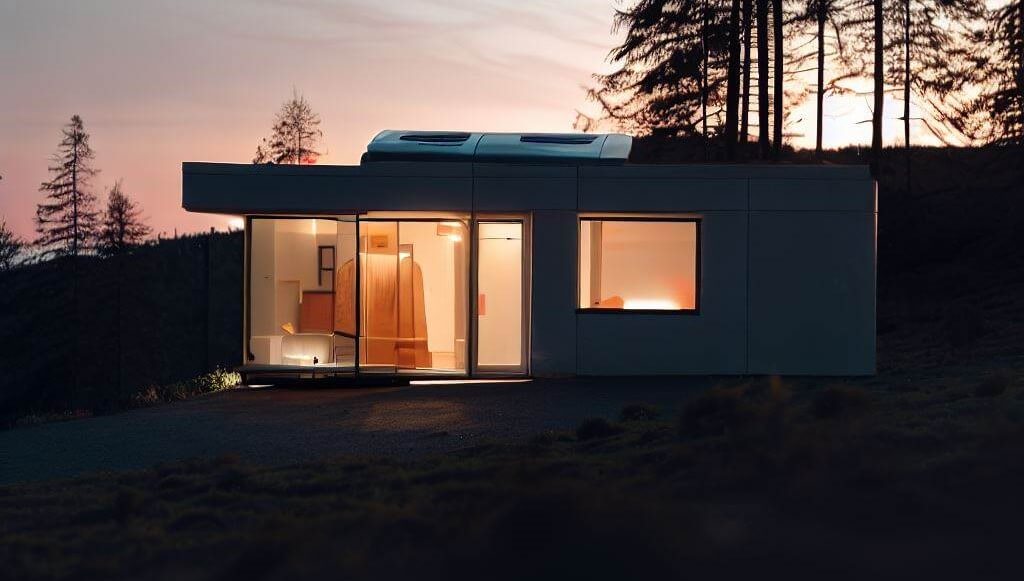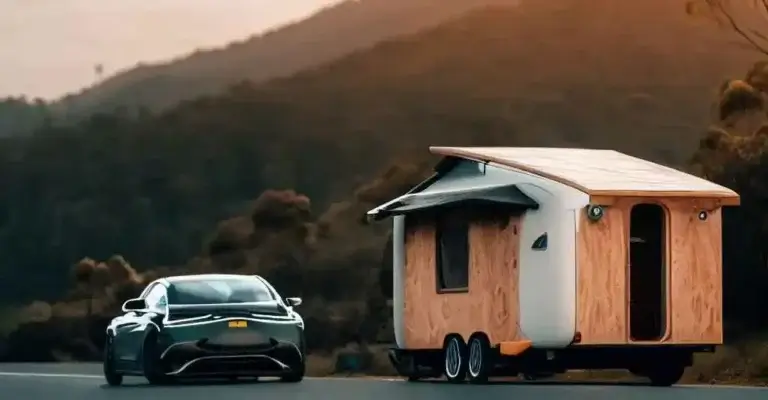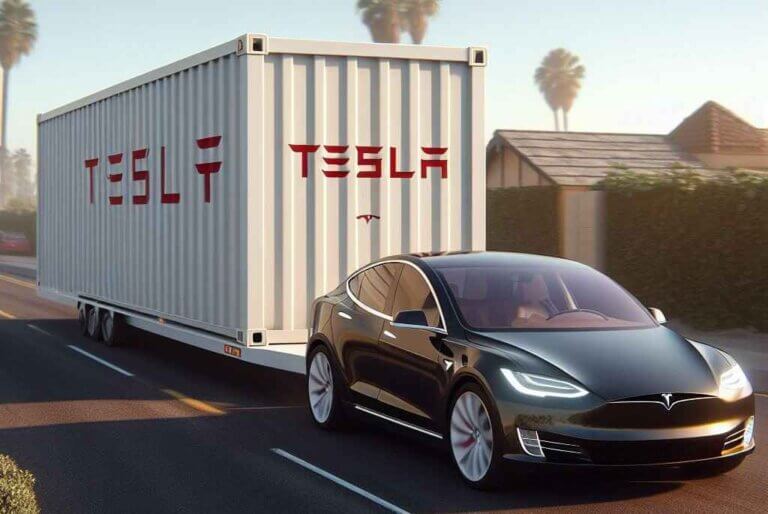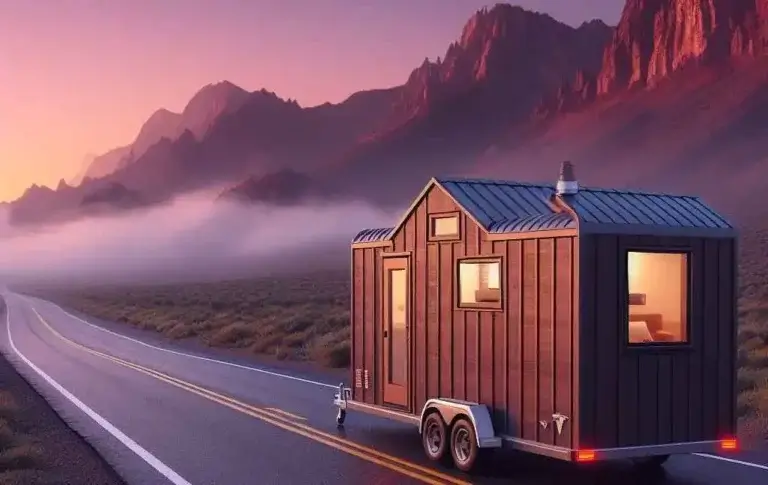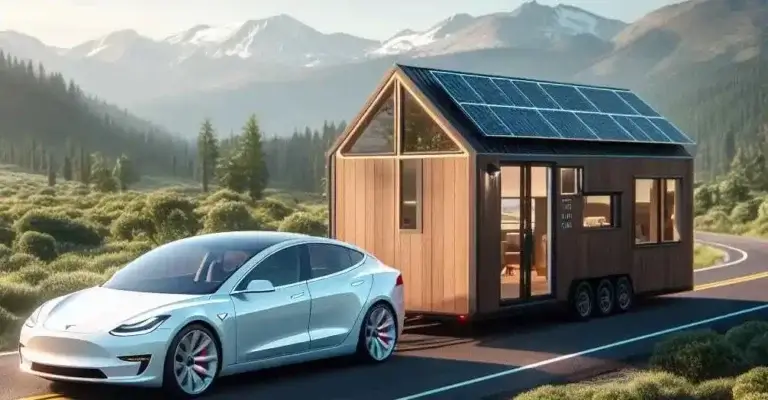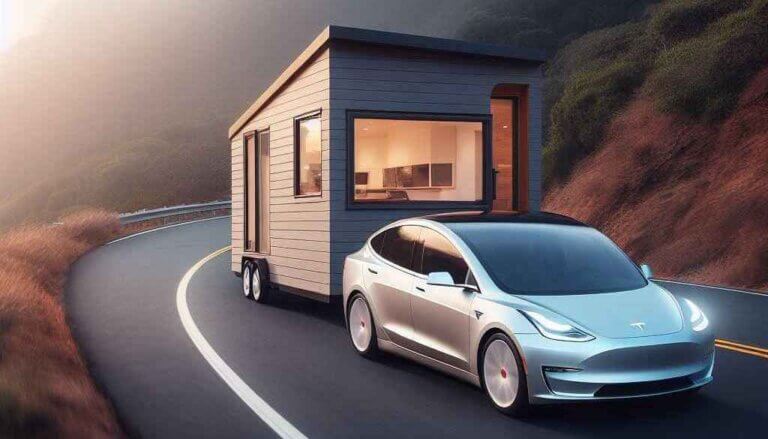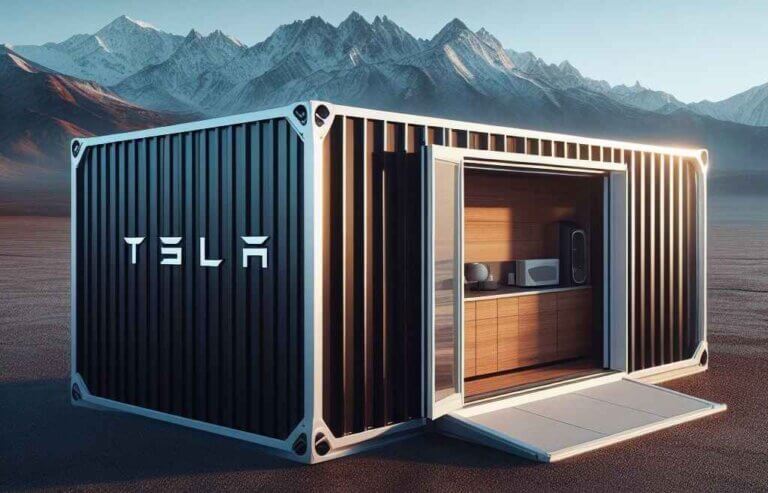Are Tesla Homes Available in Canada – Elon Musk Tiny House Movement
Are Tesla homes available in Canada is a big talk in the town. Elon Musk a visionary leader in innovation tweeted in 2021 that he wanted the Tesla homes, that will be more sustainable and affordable. These houses are going to be more energy efficient, more reliable, eco-friendly, and equipped with modern and innovative home appliances.
Although these Tesla houses are going to be more sustainable than conventional houses, there exist many concerns about their availability. There is no doubt that America and Canada both are the most first ones for Tesla home availability.
Tesla Sustainable Homes in Canada
Tesla not currently building homes in Canada. However, there are rumors that they may be planning to do so in the future. In 2021, Tesla CEO Elon Musk tweeted that he was “thinking of starting a home company” and that it would be “very important.” He also said that he wanted to make homes that were “beautiful, functional, and sustainable.”
There is no concrete evidence to support these rumors, but it is possible that Tesla could enter the homebuilding market in Canada. The company has a strong presence in the country, with several Tesla stores and service centers. They also have a large customer base in Canada, as Tesla cars are some of the most popular electric vehicles in the country.
Introduction to Tesla Homes
Tesla Homes are a line of prefabricated, energy-efficient homes that are designed and manufactured by Tesla. They are based on the Passive House standard, which is a set of rigorous energy efficiency guidelines that can result in homes that use up to 90% less energy than conventional homes.
Tesla Homes are made from high-quality materials, including steel, concrete, and wood. They are also equipped with a variety of energy-saving features, such as triple-pane windows, insulation, and solar panels. This makes them ideal for homeowners who want to reduce their energy bills and live a more sustainable lifestyle.
Prefab and Modular Homes
Prefab and modular homes are both types of prefabricated homes, which means that they are constructed in a factory and then assembled on-site. However, there are some key differences between the two types of homes.
Prefab homes are typically constructed in larger sections, such as entire rooms or even entire homes. These sections are then transported to the construction site and assembled. Prefab homes can be made from a variety of materials, including wood, steel, and concrete.
Modular homes are constructed in smaller modules, such as walls, floors, and roofs. These modules are then transported to the construction site and stacked on top of each other. Modular homes are typically made from wood or steel.
Tesla Solar Technology Integration
Tesla Solar Technology Integration is a system that combines Tesla solar panels and Powerwall home battery storage systems to create a more efficient and sustainable home energy solution. The system allows homeowners to generate their solar power during the day and store it in the Powerwall for use at night or during power outages. This can help homeowners reduce their reliance on the grid and save money on their energy bills.
Benefits of Tesla Homes
Tesla Homes are still in the early stages of development, but they are expected to offer several benefits over traditional homes. Here are some of the potential benefits of Tesla Homes:
Sustainable Living with Tesla Homes
Sustainable living is the practice of living in a way that minimizes our impact on the environment. This can be done by reducing our consumption of resources, such as energy and water, and by using renewable energy sources.
Tesla Homes are designed to be sustainable homes. These dwellings are built to be energy-efficient, using materials and construction methods that minimize environmental impact. They can also be equipped with solar panels and battery storage systems, which can further reduce their environmental impact.
Off-Grid Capabilities
Tesla Homes are designed to be energy-efficient and sustainable, and they can be equipped with solar panels and battery storage systems to further reduce their reliance on the grid. This means that Tesla Homes have the potential to be off-grid, meaning they can be powered independently of the electrical grid.
However, the exact off-grid capabilities of Tesla Homes will depend on several factors, such as the size of the home, the amount of solar energy it can generate, and the amount of energy it consumes. In general, Tesla Homes that are equipped with a solar roof and a battery for energy storage systems should be able to operate off-grid for a significant portion of the year, especially if they are located in areas with a lot of sunshine.
Energy Efficiency and Cost Savings
Tesla small Homes are designed to be energy-efficient and sustainable, which can help homeowners save money on their energy bills. Here are some of the ways that Tesla Homes can help you save energy and money:
Energy-efficient design: Tesla Homes are designed to meet the Passive House standard, which is one of the most rigorous energy efficiency guidelines in the world. This means that they are built to be airtight and well-insulated, which can help keep them cool in the summer and warm in the winter.
Sustainable materials: Tesla Homes are built using sustainable materials, such as wood, steel, and concrete. These materials are sourced from sustainable forests and mines, and they are manufactured using energy-efficient methods.
Are Tesla Homes Available in Canada
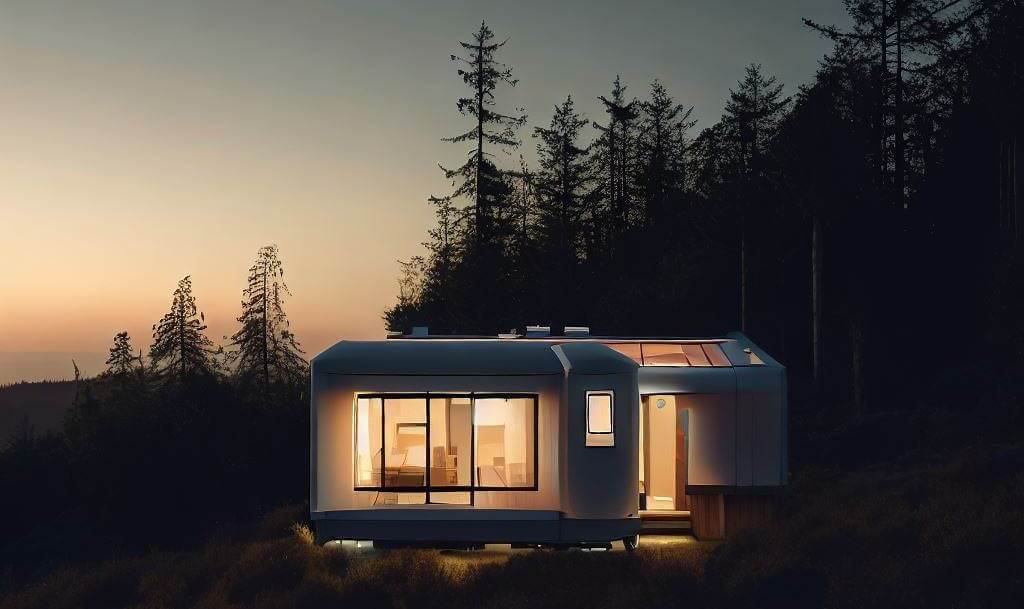
Tesla Homes are not yet available for purchase in Canada. Tesla has not yet announced any plans to build Tesla Homes in Canada. However, there are rumors that Tesla may be planning to do so in the future.
There is no concrete evidence to support these rumors, but it is possible that Tesla could enter the homebuilding market in Canada. The company has a strong presence in the country, with several Tesla stores and service centers. They also have a large customer base in Canada, as Tesla cars are some of the most popular electric vehicles in the country. In short, there is not a signal dwelling unit of an official Tesla to this date.
Current Availability in Canadian Cities
As of today, March 8, 2023, there are no Tesla Homes available for purchase in any Canadian cities. Tesla has not yet announced any plans to build Tesla Homes in Canada. However, there are rumors that Tesla may be planning to do so in the future.
Boxabl Casita – A Game Changer in Tesla Homes
Boxabl Casita is a line of prefabricated, modular homes that are designed to be affordable, easy to build, and sustainable. The homes are made from steel and concrete, and they are assembled in a factory. They can be delivered to a site and set up in a matter of days.
The Boxabl Casita is available in a variety of sizes, from 361 square feet to 500 square feet. They can be configured as a single-family home, a vacation home, or an office space. The homes are also customizable, so homeowners can choose the finishes and features that best suit their needs.
The Boxabl Casita is a relatively affordable option for homeownership. The starting affordable price for a Casita is $50,000. This is significantly less expensive than the cost of traditional construction.
Tesla Homes Distribution and Expansion Plans
Tesla has not yet announced any specific distribution or expansion plans for Tesla Homes. However, there are a few things that we can infer from the company’s past actions and statements.
First, Tesla has a history of starting small and then expanding rapidly. This was the case with the Tesla Model 3, which was initially only available in a few select markets but is now available in over 30 countries.
Second, Tesla has a strong focus on sustainability. This is evident in the company’s products, such as the Tesla Model 3 and the Tesla Solar Roof. Likely, Tesla Homes will also be designed to be sustainable.
Third, Tesla has a strong online presence. The company sells its cars directly to consumers through its website, and, likely, Tesla Homes will also be sold online.
Based on these factors, it is likely that Tesla Homes will initially be available in a limited number of markets. However, the company is likely to expand rapidly in the future. It is also likely that Tesla Homes will be sold online, and that they will be designed to be sustainable.
Exploring Elon Musk’s Tiny House Movement
Elon Musk CEO of Tesla and SpaceX is known for his innovative ideas and his willingness to take risks. In recent years, he has become a vocal advocate for the tiny house movement.
The tiny house movement is a growing trend of people who choose to live in small, self-contained homes. These homes are typically less than 500 square feet in size and can be built on a trailer or on a permanent foundation.
Elon Musk has said that he believes tiny houses are the future of housing. He has also said that he is considering building a tiny house himself. This is going to be a very spacious startup for him.
Elon Musk’s Vision for Tiny Homes
Musk’s vision for tiny houses is that they should be affordable, sustainable, and customizable living spaces. He believes that tiny houses can help people live more simply and sustainably, and he has said that he wants to make tiny houses more accessible to people of all income levels.
Musk has not yet released any specific plans for his tiny house project. However, he has said that he is working with a team of engineers and designers to develop a prototype. He has also said that he is open to working with other companies and organizations to make tiny houses more affordable and accessible.
Integration of Tesla Technology in Tiny Homes
The integration of Tesla technology in tiny homes refers to the process of incorporating Tesla’s products and services into the design and construction of tiny homes. This can include the use of solar panels, battery storage systems, smart home technology, and Tesla powerwalls.
Advantages and Challenges of Tiny Homes
Tiny homes have been gaining popularity in recent years, thanks to their potential to offer a more affordable, sustainable, and minimalist lifestyle. However, there are also some challenges associated with tiny homes.
Advantages
- Affordability: Tiny homes can be much more affordable than traditional homes, especially when considering the cost of land and construction.
- Sustainability: Tiny homes can be much more sustainable than traditional homes, as they require less energy and resources to build and maintain.
- Minimalist lifestyle: Tiny homes can help people live a simpler and more minimalist lifestyle, which can lead to a greater sense of freedom and peace of mind.
- Mobility: Tiny homes can be more mobile than traditional homes, which can be a benefit for people who want to be able to move frequently.
Challenges
- Limited space: Tiny homes have limited space, which can make it difficult to fit all of the belongings that people are used to.
- Privacy: Tiny homes can be small, which can make it difficult to find privacy.
- Weather challenges: Tiny homes can be more susceptible to weather challenges, such as extreme heat or cold.
- Regulations: Tiny homes are not regulated in the same way as traditional homes, which can make it difficult to get permission to build or live in them in some areas.
- Maintenance: Tiny homes require more maintenance than traditional homes, as they are often made with less durable materials.
Future of Tesla Homes in Canada
The future of Tesla Homes in Canada is uncertain, as Tesla has not yet announced any specific plans for the country. However, there are a few factors that could make Tesla Homes a viable option in Canada.
First, Canada has a strong market for sustainable housing. The country has several government incentives in place to encourage the development of green homes, and there is a growing demand for homes that are energy-efficient and environmentally friendly. This could make Tesla Homes, which are designed to be sustainable, attractive to Canadian buyers.
Second, Canada has a large population of millennials. Millennials are increasingly interested in tiny homes and other alternative housing options. This could make Tesla Homes a popular choice for this demographic.
Third, Canada has a strong economy. This could make it easier for Tesla to finance the development and construction of Tesla Homes in Canada.
Canadian Market Demand for Tesla Homes
The Canadian market demand for Tesla Homes is difficult to quantify as Tesla has not yet announced any specific plans for the country. However, there are a few factors that could suggest that there is a potential market for Tesla Homes in Canada.
- The growing popularity of tiny homes
- The strong economy
- The government support
- The cost of living
Impact of Tesla Homes on the Real Estate Industry
It is still too early to say for sure what the impact of Tesla Homes will be on the real estate industry. However, there are a few potential impacts that could be seen.
- Tesla Homes could lead to a shift in demand for smaller homes. Tesla Homes are typically smaller than traditional homes, and this could lead to an increased demand for smaller homes in the real estate market. This could be seen as a positive impact on the real estate industry, as it could help to address the problem of housing affordability.
- Tesla Homes could lead to a new market for sustainable housing. Tesla Homes are designed to be sustainable, and this could lead to a new market for sustainable housing in the real estate industry. This could be seen as a positive impact on the environment, as it could help to reduce the carbon footprint of the housing sector.
- Tesla Homes could lead to new technologies being adopted in the real estate industry. Tesla Homes are likely to be equipped with the latest technology, and this could lead to new technologies being adopted in the real estate industry. This could be seen as a positive impact on the real estate industry, as it could help to make homes more efficient and comfortable.
Collaboration with Local Governments and Regulations
It is not clear how the company will collaborate with local governments and regulations. However, Tesla will likely need to work with local governments to ensure that its tiny homes comply with all applicable regulations. This could include zoning laws, building codes, and environmental regulations.
Tesla may also need to work with local governments to obtain permits and approvals for the construction and sale of its tiny homes. In some cases, Tesla may need to make modifications to its tiny homes to comply with local regulations.
The level of collaboration between Tesla and local governments will likely vary depending on the specific location. In some areas, Tesla may face more challenges than in others. For example, Tesla may face more challenges in areas with strict zoning laws or building codes.
Does Elon Musk Use Boxabl Casita’s tiny home?
Musk has said that he uses the Casita as a guest house for friends and family who visit him in Texas. He has also said that he is considering building a larger Tesla home in the future. The Tesla home would be designed to be more sustainable and energy-efficient than traditional homes.
It is not clear when Musk plans to build the Tesla home or where it will be located. However, he has said that he is committed to making sustainable housing more affordable and accessible. The Tesla home could be a significant step towards achieving this goal.
Is Tesla’s solar roof and powerwall available in Canada?
Yes, Tesla solar roofs and powerwalls are available in Canada.
Tesla Solar Roof is a solar energy system that integrates solar panels into the roof of a home. It is designed to be more aesthetically pleasing than traditional solar panels and to provide a seamless integration with the home’s roof.
Tesla Powerwall is a battery storage system that can store energy generated by solar panels or the grid. It can be used to power homes during power outages or to provide backup power during peak energy usage times.
Frequently Asked Questions
How many Tesla homes are sold in Canada?
As of today, March 8, 2023, there are zero Tesla homes sold in Canada. Tesla has not yet announced any plans to build or sell tiny homes in Canada. However, the company has been exploring the idea of building tiny homes, and it is possible that they will be released in the future.
How many Tesla homes have been sold overall?
Zero Tesla homes have been sold yet as there are currently no Tesla homes available. Tesla hasn’t made any announcements about its plans to build or sell tiny homes yet. However, the company has been exploring the idea of building tiny homes, and it is possible that they will be released in the future.
Are People Using Powerwall in Canada?
Yes, people are using Powerwall in Canada. Tesla Powerwall is a battery storage system that can store energy generated by solar panels or the grid. It can be used to power homes during power outages or to provide backup power during peak energy usage times.
Tesla Powerwall is available in select areas of Canada. To find out if it is available in your area, you can contact Tesla customer support.
How long does it take to get a Boxabl?
The wait time for a Boxabl Casita is currently 12-18 months. This is because Boxabl is a relatively new company and is still ramping up production.
Boxabl has two factories, one in Las Vegas, Nevada, and one in Phoenix, Arizona. The company is currently producing about 100 Casitas per month, but it plans to increase production to 500 per month by the end of 2023.

